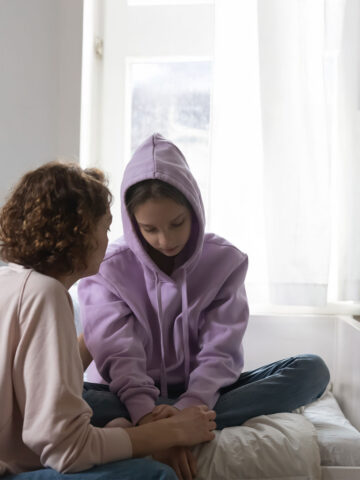If the ongoing spread of coronavirus (COVID-19) is causing anxiety, stress and uncertainty for grownups, consider how troubling it may be for children.
Depending on their age and media exposure, children may know more about the virus than grownups think. And even if unaware, children still might sense tension and anxiety from adults around them.
Here, CHOC pediatric psychologist Dr. Sabrina Stutz offers seven things parents can do to help reduce their children’s anxiety about COVID-19.
Meet children’s concerns with validation, compassion
- Listen carefully to their concerns and learn where they heard their information. Validate their fears by saying something like, “It can be frightening when a new illness comes around, and we don’t know how long it will last.”
- Gently correct any misconceptions they may have heard and encourage them to continue to ask questions.
- Maintaining a routine can provide children a sense of security. Keeping a usual schedule – including schoolwork, activities and chores – will protect mental and physical health.
Stick to developmentally appropriate facts
- Avoid having adult-level conversations about COVID-19 around children. Similarly, carefully monitor children’s exposure to media reports about the virus.
- Answer questions with brief, developmentally appropriate explanations. For example, you might tell a young child, “Coronavirus is a new type of germ that can make some people very sick, and so it is important for us to wear masks around people other than our family, keep 6 feet away from people outside our family, wash our hands more, avoid touching our face, and spend time outside rather than in buildings to keep ourselves and others healthy.”
- Remind children that doctors and other experts around the world are working hard to stop the virus and will let us know when it is safe to return to certain activities. This can help kids understand that smart, capable people are taking action.
Reassure kids by empowering them
- Telling kids how they can help provides a sense of agency and can turn anxiety into an actionable goal.
- Reassure children that they can protect themselves and others by wearing a mask, staying 6 feet away from others, practicing proper hand-washing and cough etiquette and taking other healthy steps.
- Kids can also be included in other family-wide For example, if you are expecting to be staying at home for a while, ask the child what they might want to snack on or what activities they might enjoy. Be creative with helping your child choose activities that appeal to their passions or curiosities.
Look for kid-friendly methods
- Make learning about hand-washing and other preventative measures fun. Help kids learn about germs by giving them some lotion and then sprinkling glitter on their hands. Tell them the glitter is like germs, and then ask the child to try to wipe it off with a paper towel or just water. They won’t get far! Then you can explain how soap and warm water removes the glitter – and germs – best.
- Teach kids how long to wash hands for by singing a 20- to 30-second song together. “Happy Birthday” or the “ABCs” are classics. You can also be creative and estimate 20-to-30 seconds of any song the child likes.
Emphasize kindness
- As always, it is helpful to teach kids to continue to be kind to all people, regardless of their country of origin or their appearance. Kindness is always possible – even when they feel afraid.
- Educate children that most people who visit the doctor or wear a mask probably don’t have the virus.
- It is important to remind children that we are all trying our best to stay healthy and it’s not anyone’s fault if they do get sick.
Remember to model positive behavior
- Parents who show good coping skills can help reassure kids that they are safe. After all, kids learn from their parents how to react in new situations.
- Remember that kids make mistakes. If your child accidentally does not wash their hands, gently remind them. Scaring children with the potential consequences of their mistakes is not helpful.
- Adults should model self-care behaviors: Maintain activities and sleep schedules. Eat healthfully and practice hand hygiene and cough etiquette.
- It’s also helpful for grownups to limit their own media consumption around coronavirus (COVID-19) and stick to a few trusted resources such as the Centers for Disease Control to prevent information overload and anxiety.
Watch for behavior changes
- Changes in a child’s sleep, appetite, interest in being with friends or leaving the house, or levels of reassurance seeking, as well as excessive hand-washing can be signs that more help is needed.
- If basic stress reduction techniques like deep breathing, distraction or guided imagery don’t help, reach out to your primary care provider for additional support.
This article was updated on August 18, 2020.
Get more expert health advice delivered to your inbox monthly by subscribing to the KidsHealth newsletter here.
Learn more about COVID Vaccines for Children and Teens
Get answers to your frequently asked questions – and some peace of mind – with this complete guide to COVID-19 vaccines from CHOC pediatric experts.





